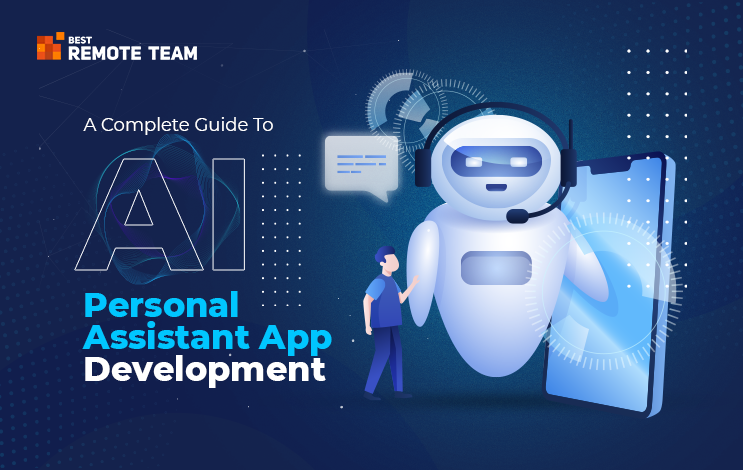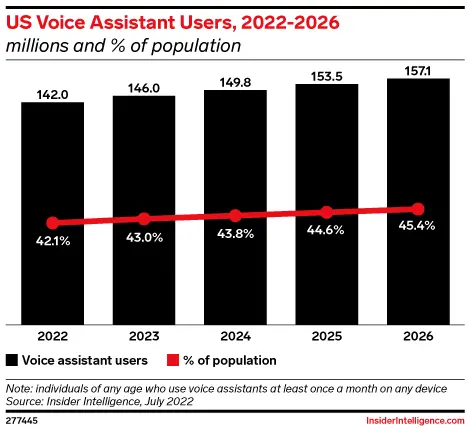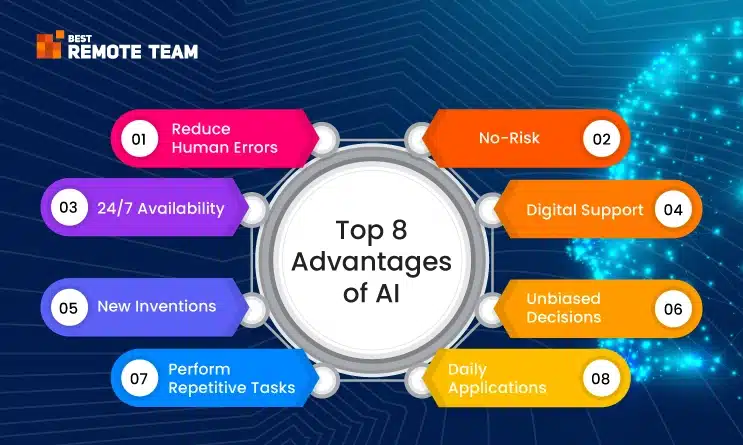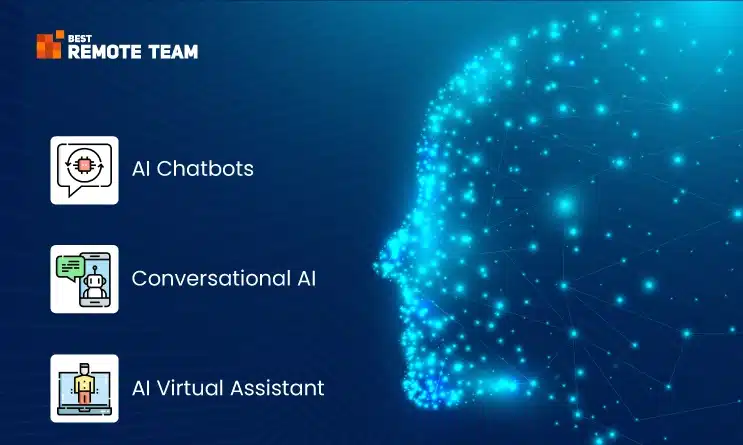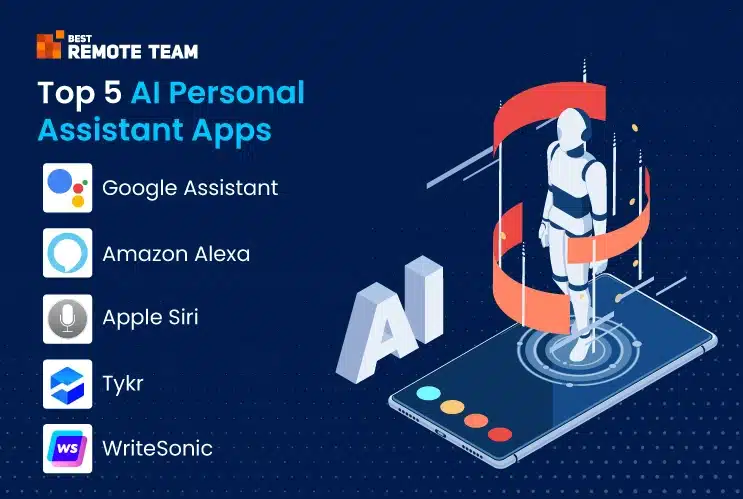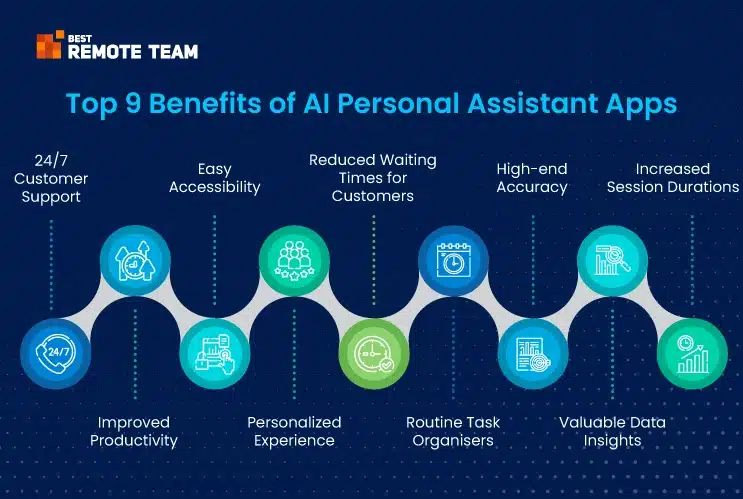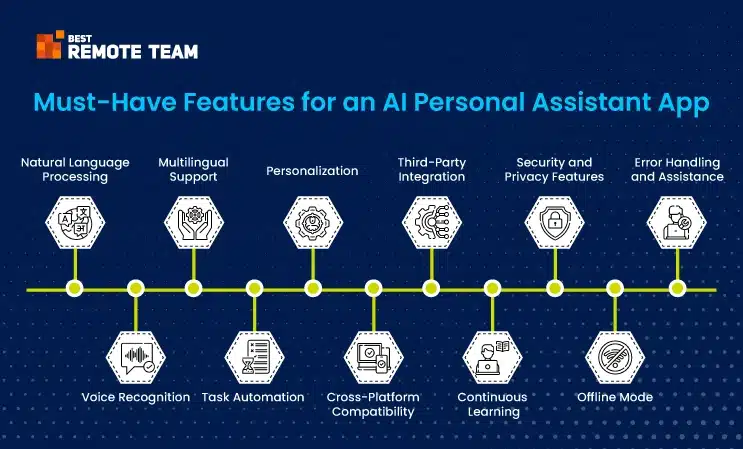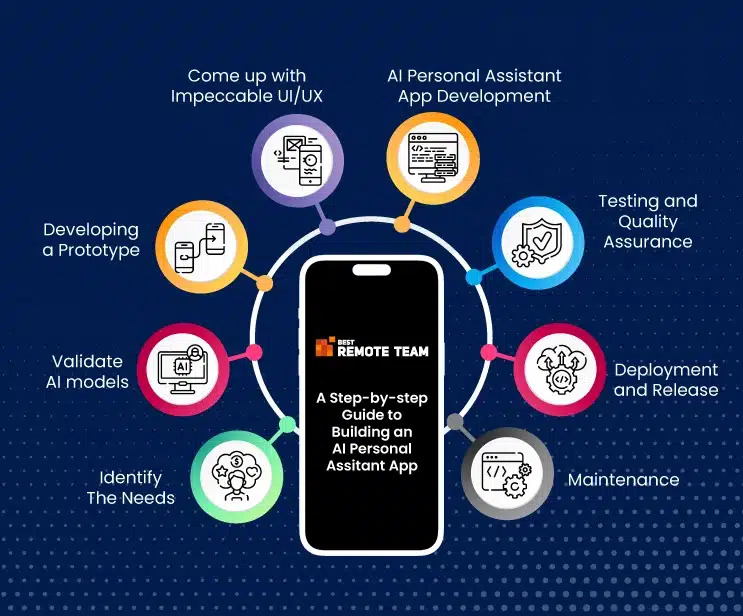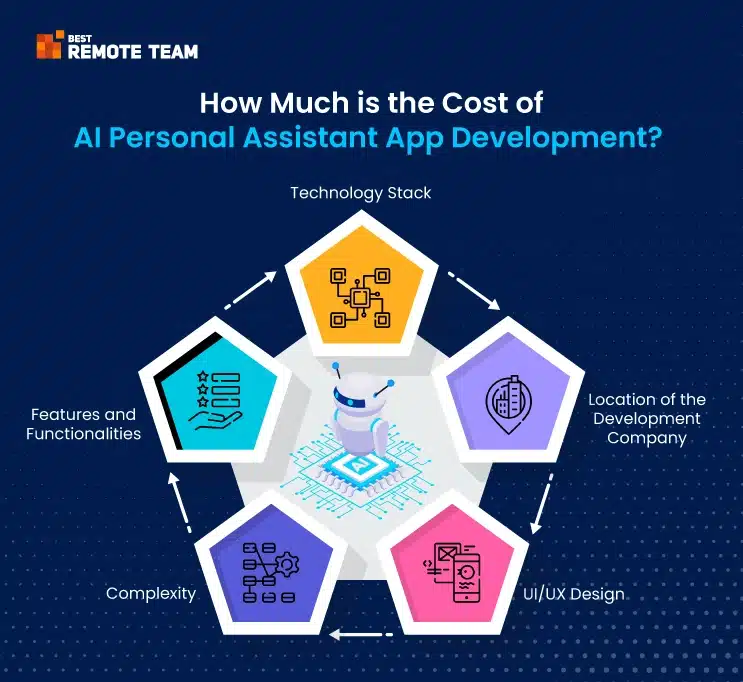What is Artificial Intelligence?
Artificial Intelligence has carved a niche for itself in recent years. It has been a pioneer technology behind various smart and intelligent devices and technologies. With AI, you can build human-like machines that can quickly and seamlessly perform multiple tasks without human intelligence.
From self-driving cars to chatGPT, we have come a long way in using AI technology to develop high-end AI tools to perform various tasks. For businesses, it comes with a great many possibilities and opportunities. From streamlining their processes to eliminating the need to perform repetitive tasks to offer personalized experiences to customers, AI can provide a large number of benefits to businesses.
What are the Advantages Of AI?
Let’s discuss the benefits that AI technology has to offer.
#1 Reduce Human Errors
With AI at your side, you can reduce human errors by a significant margin while improving accuracy and precision in processes and operations. AI uses previous incidents and information to perform tasks with well-developed algorithms, eliminating errors significantly.
#2 No-risk
AI robots can perform dangerous tasks instead of humans to reduce life-threatening risks.
#3 24/7 Availability
When it comes to humans, they need rest. Various studies suggest that humans can work effectively for 2 to 4 hours a day. On the other hand, AI machines and robots can work uninterrupted for as long as you want. Also, they think much faster than humans based on the algorithms to offer quick outputs.
#4 Digital Support
With AI, you can easily offer digital services and support to your users with personal digital assistants. For example, various websites and apps deliver content as per visitors’ requests, with virtual assistants’ help.
#5 New Inventions
AI is the backbone of various innovations to address challenges and issues. Recently, scientists have developed an AI-based tool to detect breast cancer at an earlier stage.
#6 Unbiased Decisions
AI robots are free from emotions and feelings, unlike humans. They are efficient and rational in offering unbiased decisions based on pure facts and findings.
#7 Perform Repetitive Tasks
Get rid of those repetitive tasks and save human hours performing them daily. AI robots can do it for you quickly and accurately. Use AI to automate those tasks and let your employees focus on more creative tasks.
#8 Daily Applications
OK, Google, Siri, Alexa, and Cortana are AI virtual assistants that have become inseparable parts of our lives. These applications can perform various tasks based on commands given to them.
What is an AI Personal Assistant App?
An AI personal assistant app is an app that is designed to make lives simpler by streamlining various tasks. An AI personal assistant app works on AI algorithms designed by developers. These algorithms are designed in a manner that they respond to user commands, perform tasks, and do other things.
A smart AI personal assistant app can do various things for you, like sending reminders, answering questions, processing requests, shopping online, and controlling multiple devices. You can go for native or cross-platform app development, depending on your objectives and scalability goals.
Not just that, these AI apps also adapt and improve based on feedback and user interactions. With an AI app, businesses can offer a fascinating personalized experience to users.
How Does an AI Personal Assistant App Work?
To understand AI personal assistant apps, you need to know how they work. Let’s understand in brief.
#1 Natural Language Processing (NLP)
An AI personal assistant app, also called NLP, cannot work without Natural Language Processing. With NLP, computers can understand and interpret human languages and process requests by analyzing different words, sentences, phrases, and contexts.
#2 Voice Recognition
Siri and Alexa are voice-controlled personal assistants that use voice recognition technology. Here, speech is converted into text, and then AI apps process requests on voice instructions.
#3 Machine Learning
Machine Learning is a branch of Artificial Intelligence. The technology uses user preferences and past behavior to predict needs. Based on this data, AI apps offer you the most accurate answers to your requests.
#4 Cloud Computing
Some AI personal assistant apps use cloud computing to process requests and perform tasks. When a user sends a request, the app will send the request to cloud servers. These servers will process the request, collect data, and send relevant responses to users. Ask the AI development services provider about your choice of using cloud computing.
#5 Integration with third-party Applications and Services
Most of the time, AI personal assistant apps are integrated with other third-party apps and services to enhance their capabilities and functionalities. With third-party integrations, AI apps can perform various tasks, such as controlling your devices, ordering food, and reminding you about professional meetings.
#6 Contextual Awareness
The best thing about AI personal assistant apps is that they don’t just follow your commands blindly but also work on context to offer you the best answers. They analyze your previous orders, likes, locations, and other available personal data to process your request.
#7 Privacy and Data Security
AI personal assistants are highly secure and emphasize data security and privacy. They anonymize and encrypt user data and allow them to review and delete their interactions in the form of text and voice.
#8 Continuous Updates and Development
Modern AI personal assistant apps are highly advanced and are evolving with time. Developers are working hard to ensure these AI apps’ increased productivity, accuracy, and precision.
Types of AI Personal Assistants
There are three types of AI personal assistants available in the market.
#1 AI Chatbots
You must have seen automatic chatbots that offer you answers on ecommerce websites. They are virtual assistants that analyze your text requests and respond accordingly. Not just websites, these AI chatbots are highly popular on social media platforms and messaging apps as well. Mostly, AI chatbots use machine learning and NLP to send replies to users.
#2 Conversational AI
It is an advanced form of AI chatbot. Conversational AI assistants engage your users in conversations. You can expect human-like conversations with these assistants in text and voice interfaces. Conversational AI chatbots can quickly understand complex language structures and user intent. They can be used to handle multiple tasks by offering a more organic and human-like experience to users.
#3 AI Virtual Assistant
AI virtual assistants are the most advanced AI assistants. They can perform various tasks accurately across multiple devices and platforms. Also, users can easily interact with them in natural language. Also, you can easily integrate these virtual assistants with other devices and applications. You can easily control devices, manage your day-to-day operations, manage schedules, and access answers quickly.
Top 5 AI Personal Assistant Apps in the Market
A wide range of AI personal assistant apps is available in the market. Let’s check out the top five apps.
#1 Google Assistant
Google develops it and can perform various operations and tasks. You can easily engage in conversations with Google Assistant to perform tasks like controlling your home equipment and devices, getting answers to queries, and many more. All you need to do is to share your command, starting with “Hey, Google.”
#2 Amazon Alexa
Amazon developed this advanced personal assistant app to perform multiple tasks quickly and accurately. Apart from helping you shop on Amazon, this app can also control smart home devices, play music, and do many other tasks.
#3 Apple Siri
Siri is developed by Apple and runs excellently on various iOS devices like watchOS, tvOS, and others. It is based on the voice recognition method and can perform various tasks like making recommendations, performing multiple actions, and responding to queries and questions.
#4 Tykr
Tykr is a financial personal assistant app that can help make informed financial decisions. You can get highly clear, actionable inputs for stock market and investment-related subjects.
Read More: An Essential Guide to Building an Effective Finance App for iOS
#5 WriteSonic
Do you want to generate original copies for your business? WriteSonic is an AI-based content assistant app that can help you write blogs, articles, emails, and other content forms. You can write product descriptions for your e-commerce website or write your Google ad copy. It is an all-in-one writing assistant app that can help you get a competitive edge by producing SEO-friendly content.
What are the Benefits of AI Personal Assistant Apps?
AI personal assistant apps offer a wide range of benefits for businesses to improve their processes and user experience. Before you decide to develop an AI assistant app, check out some benefits in detail:
#1 24/7 Customer Support
With AI personal assistant apps, you can offer 24/7 support to your customers. They don’t get tired or irritated with multiple inquiries and can provide a seamless user experience to users with well-researched and well-analyzed responses.
#2 Improved Productivity
Businesses can improve the productivity and efficiency of various processes and operations by allocating tasks to AI personal assistant apps. Unlike humans, AI apps can efficiently perform repetitive tasks without any errors.
#3 Easy Accessibility
AI personal assistant apps are easily accessible from any device and anywhere. You only need an active internet connection and a device to use the app.
#4 Personalized Experience
AI personal assistant apps work based on advanced AI algorithms. These AI algorithms are updated based on personal experiences, behavior, and activities. Hence, they can analyze customers’ likes, interests, and personal choices. You can offer a highly personalized experience to users.
#5 Reduced Waiting Times for Customers
When you have an advanced system that exceeds human limitations, you can respond to multiple queries simultaneously. With AI personal assistant apps, you can quickly address a large number of questions in a short time. It can reduce waiting times for customers.
#6 Routine Task Organisers
With AI personal assistant apps, you can effectively organize routine tasks.
#7 High-end Accuracy
AI personal assistant apps offer accurate responses to queries based on AI algorithms.
#8 Valuable Data Insights
AI algorithms also can analyze and process data from various sources. You can make data-centric business decisions based on these valuable data insights.
#9 Increased Session Durations
AI personal assistants can offer quick responses to requests and a seamless user experience for visitors. Such a satisfying experience will increase session durations naturally.
Critical Features for an AI Personal Assistant App
Here is a list of features to incorporate into your AI personal assistant app.
#1 Natural Language Processing
With this feature, you can have an AI personal assistant app. With this feature, the app can easily understand and interpret user commands and respond to them.
#2 Voice Recognition
You must also incorporate voice recognition technology to ensure the app understands user voice commands.
#3 Multilingual Support
Your app must support multiple languages to target a wider audience from different geographic areas.
#4 Task Automation
The app must allow users to automate routine tasks like sending reminders and messages, scheduling appointments, etc.
#5 Personalization
Use AI algorithms to personalize the app for maximum engagement.
#6 Cross-Platform Compatibility
The app must be accessible from various devices and platforms like smartphones, tablets, computers, etc.
#7 Third-Party Integration
With third-party integrations, you can easily add more advanced features and functionalities to the app. Also, such integrations allow the app to perform various tasks efficiently.
#8 Continuous Learning
Use Machine Learning algorithms to keep the app functioning and adaptive to user commands. With such continuous learning, AI apps can offer more personalized and advanced responses to commands.
#9 Security and Privacy Features
You must incorporate security and privacy features into the app to make it difficult to breach from possible cyber attacks.
#10 Offline Mode
Users should be able to use the app even when not connected to the internet. At least, they should be able to use some features offline.
#11 Error Handling and Assistance
In case of the unavailability of proper responses, the app should be able to generate helpful assistance.
A Comprehensive Guide to Building an AI Personal Assitant App
Step – 1 Identify The Needs And How To Address Them
The first part is research. You need to conduct thorough research to identify the needs of the users. At the same time, you also need to define your objectives behind the app development.
- What is your purpose in developing an app, and how can you address the concerns of your audience?
- Who are your competitors and target audience?
Answering these questions can help in defining your objective. Go for a user-centric approach to understand the pain points of your audience and the means to solve them.
Step – 2 Validate AI models
The next part is Proof of Concept. You must validate the AI models by feeding them data and seeing the outcome.
To validate AI models, you need to think of a problem. Now, you need to validate multiple scenarios for this problem and how you can choose, customize, and adjust ML algorithms for this particular problem. Without this step, developing an AI personal assistant app would be very challenging.
Step – 3 Developing a Prototype
The next step is to develop a prototype for the app. Before you start designing the app, design a few vital screens to validate the idea and get feedback from real users. The main aim of developing a prototype is to check the engagement and use real-time feedback from users to build a better and highly advanced app with an intuitive and immersive user interface.
Also, developing a prototype can save you designing costs as it will give you an idea about various screens and how users receive them.
Step – 4 Come up with Impeccable UI/UX
The next part is designing outstanding and user-centric UI/UX for the app. We have a prototype; all you need to do is work with other screens to complete the app’s design. Finish all the screens with all the states and arrange UI assets for developers.
Step – 5 AI Personal Assistant App Development
Now, we have a ready design and AI algorithms for developers to start the actual development. We need to start on the app’s front end to quicken the app development. Developers have trained AI models, UI/UX design, and the right tech stack to develop the app. They need to start coding the app.
In the development phase, developers can use ready AI models or build them from scratch. If you prefer to use trained AI models, ensure they are already fine-tuned and ready to use. If developers choose an alternative approach, they must train these AI models.
Also, developers need to choose whether to go for cloud-based app deployment or on-device deployment.
Furthermore, developers will need a DevOps architecture to convert the code into a testable app.
Step – 6 Testing and Quality Assurance
Testing is an ongoing part of the app development. Development and testing go hand-in-hand. Quality analysts will check each feature and functionality by performing various testing methods.
Step – 7 Deployment and Release
Once the app is developed and tested thoroughly on a production environment, it is time to deploy it in stores. It should not take much time, as the app has a proper DevOps setup.
Start implementing the marketing strategies if you have any. Also, you can start app store optimization techniques once the app is deployed on the App Store or Google Play Store.
Step – 8 Maintenance
This part is crucial as well. Here, developers will closely monitor the app and monitor how it functions. Also, they will consider various end-user reviews and work on their suggestions. Developers also will use key performance analytics to update the app regularly to offer an enchanting user experience to app visitors.
How Much Does an AI Personal Assistant App Cost?
Various factors affect the price when estimating the cost of AI personal assistant app development. Let’s check out them.
#1 Features and Functionalities
It will cost you more if you want to add more advanced features and functionalities to the app. For example, features like multilingual support and machine learning will cost you more. Ask the AI development services provider about the features and functionalities you want to incorporate into the app.
#2 Complexity
The app’s complexity will also determine the cost of the app development. For example, third-party integrations within the app might cost you more. The more complex your app is, it will require more resources, money, and time to develop an app.
#3 UI/UX Design
If you add highly advanced animations, graphics, and UI elements, you will pay more to designers. Developing a user-friendly interface is vital to make the app successful. Hence, you may invest more in this part.
#4 Location of the Development Company
Have you outsourced the mobile app development project? If yes, the country of the outsourcing company will play a significant role in determining the app development cost. For example, choosing a company based in the US will cost you more than a company in India or Ukraine.
#5 Technology Stack
You will use a wide range of development tools, programming languages, and frameworks to develop a feature-rich AI personal assistant app. It might cost you more than creating a simple app with basic features. Not all development tools and frameworks are open-source. To use some of them, you need to pay fees.
People also read: Cost of Building a Cricket Fantasy Mobile App
Emerging Trends in AI Personal Assistant Development
The future of AI personal assistant apps is highly promising. With continuous advancements in the domain, we can foresee highly versatile and scalable AI assistants performing various challenging and complex tasks without human intervention.
Take the example of ChatGPT, a recent OpenAI tool that has become the talk of the town for a year now. Apart from assisting in writing, this tool can help developers write code for web or mobile app development.
In the future, AI virtual assistants will be more advanced, conversational, and capable of handling complex tasks. Also, the rise of IoT, another promising technology, will surely expand the range of processes and tasks these virtual assistants can perform.
AI personal assistants will touch almost all business areas like customer support, sales, marketing, production, inventory management, complaint handling, etc.
Conclusion
That will be all from my side. AI-based personal assistants can perform various tasks to achieve accuracy and precision. We have covered almost everything you need to develop an AI assistant app.
Apart from streamlining your processes and operations, you can also offer excellent personalized services to your customers with the help of these AI assistant apps. They can save time and reduce costs by automating tasks and performing user requests.


